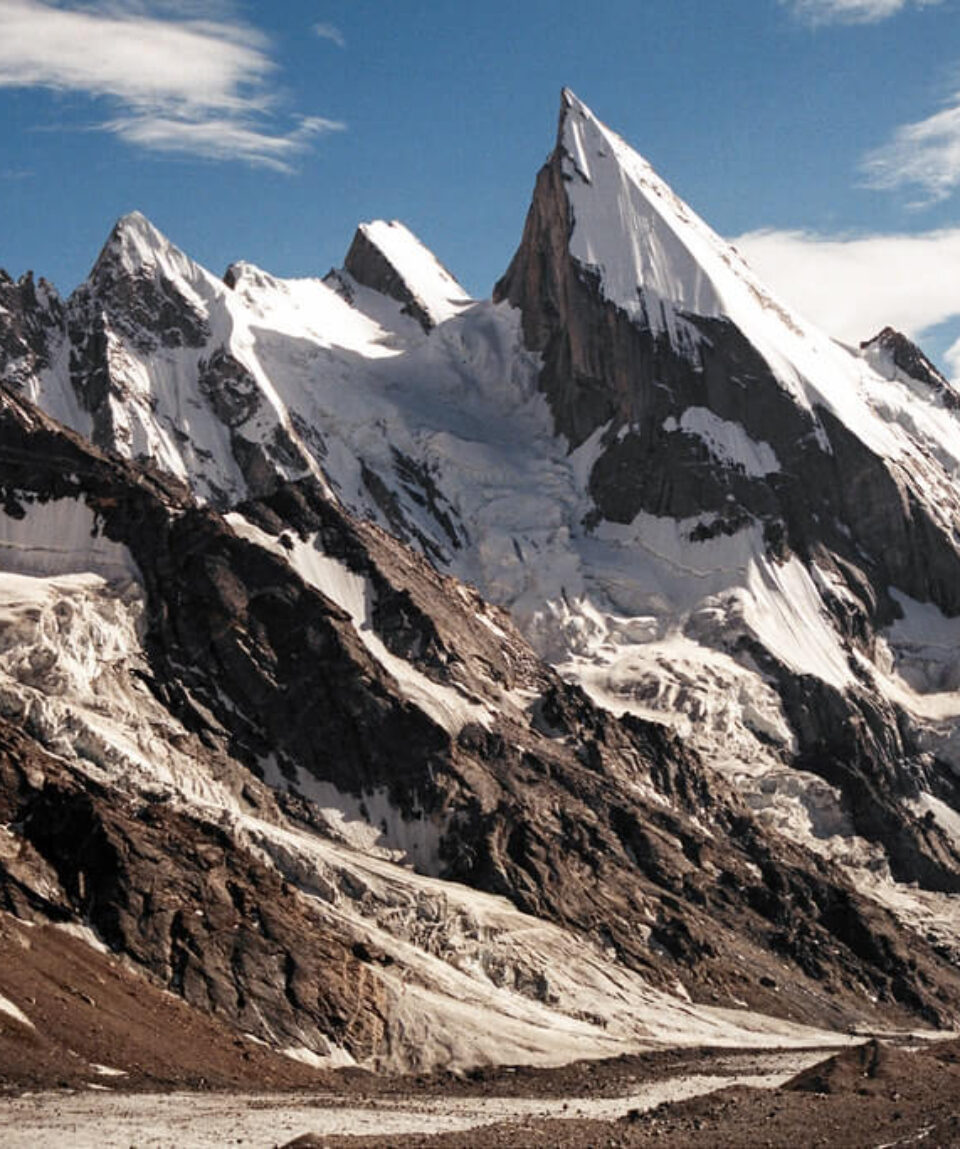Laila Peak Expedition
fromLaila Peak Expedition: Take part in a thrilling journey to the Karakoram Range to climb the legendary Laila Peak, which is 6,096m high. Accept the challenge of Hushe Valley’s magnificent beauty and spear-like shape.
-
Reviews 0 Reviews0/5
-
Vacation Style Holiday TypeCamping, Climbing, Expedition Style, Guided, Mountaineering, Rock Climbing, Tours & Sightseeing, Trekking
-
Activity Level Tough
-
Group Size Large Group
The Laila Peak Expedition invites daring explorers to go on a remarkable expedition amidst the magnificence of the Karakoram Range in Gilgit-Baltistan, Pakistan. Climbers from all over the world are drawn to attempt this thrilling and difficult mountaineering task because of the mesmerizing spear-like shape of Laila Peak, which rises to a height of 6,096 meters and is situated close to the alluring Gondogoro Glacier in the Hushe Valley.
The northwest face is a commanding 45-degree slope that rises impressively vertically for 1,500 meters. The climb necessitates a tremendous fusion of mountaineering prowess, physical stamina, and steadfast resolve to negotiate the challenging terrain and unpredictability that lie ahead.
The Hushe Valley is the sole practical entrance to this spectacular mountain and is the only route to the peak. However, because the area lies within a “restricted zone” in Pakistan, careful planning and coordination are needed to obtain the expedition’s license and permits.
The Laila Peak Expedition offers a chance to unite with the famed Karakoram Mountains, a chain that includes some of the highest mountains in the world, including K2, Gasherbrum, and Nanga Parbat. The Karakoram Range, which spans an astonishing 500 kilometers in length and 200 km in width, weaves a gorgeous tapestry, joining the Hindukush and Himalayan Mountains at key locations.
Laila Peak has a unique history that matches its attractiveness. Simon Yates led the first successful trip there in the 1980s. The team’s successful ascent, which was accompanied by Sean Smith and Mark Miller, increased the mountain’s legend status. Although there have been conflicting claims regarding the peak’s precise height, the climbing community generally accepts that it is 6,096 meters.
Starting the Laila Peak Expedition guarantees a once-in-a-lifetime experience that is full of moments of awe and hardship. Climbers are met with beautiful views as they go through an ice and rock terrain and the sense of accomplishment that comes from overcoming nature’s challenges.
This expedition offers an opportunity for self-discovery and personal development, not just an adrenaline-pumping endeavor. The unwavering human spirit and the unquenchable will to conquer the unknowable are reflected in each step taken toward the summit.
- Base camp lodging (single supplement)
- A complete base camp with a dining tent, restrooms, showers, and solar power
- All domestic/internal transportation
- Every domestic flight
- 50 kilograms (110 pounds) of personal baggage
- All meals (B, L, D) while on the trek and at base camp
- Group satellite phones and emergency devices with a set calling fee
- Arrival and departure nights of two nights each in an Islamabad hotel (bed and breakfast only)
- Guides, cooks, kitchen workers, assistants, porters, etc. are covered by staff insurance.
- Pakistani cook with experience
- Porters for all expedition supplies and the kitchen staff
- Base camp solar power
- Generator of electricity (backup for high-voltage equipment)
- International airfare
- Fees for permits and royalties are based on the number of people
- Personal gear for climbing, dressing, and sleeping
- Equipment for group climbing, including rope, ice axes, snow bars, EPI gas, and other items
- Insurance coverage for mountain rescue and evacuation is required.
- Food and lodging above base camp
- Any assistance beyond base camp
- Talking radio (walkie-talkie)
- Climate reports
- Cargo of personal items to/from Islamabad
- The visa cost for Pakistan
- $250 total in tips/gratuities for the staff, cook, and assistant(s).
- In Islamabad, meals
- Additional hotel stays following the ascent
- Trip cancellation insurance
- All costs incurred in the event of an early wind-up or summit (additional hotel stays, hotel meals, and evacuation)
- Charges incurred as a result of delays that are beyond Karakoram Trails’ control (for cause majeure)
- Personal correspondence between Pakistan and the home country by phone, fax, and email.
- Day 01 Arrive at Islamabad International Airport
- Day 02 Fly to Skardu, Karakoram
- Day 03 Spend a Free day in Skardu (2,598m)
- Day 04 Drive to Hushe Village
- Day 05 Trek to Saicho
- Day 06 Trek to Dalchangpa
- Day 07 Trek to Laila Peak Base Camp
- Day 08 -18 Ascent of Laila Peak
- Day 19 Trek Back to Saicho
- Day 20 Return Back to Hushe Village and drive to Skardu
- Day 21 Rest day/contingency plan in Skardu
- Day 22 Fly to Islamabad
- Day 23 Fly to your home country
Please complete the registration form (click the green “register now and pay later” button) on this page to begin the registration process. Once you submit your form, we will contact you.
If your travel dates do not coincide with our departure dates or if you want to walk alone (with a guide, as required by law), we can arrange solo excursions.
Trekking alone is more expensive than hiking with others. However, it’s crucial to realize that climbing Mount K2 is impossible without a guide and, more crucially, porters (even if a visitor doesn’t want them). Reason: By law, guides are not required to carry any equipment. They need porters to transport everyone’s personal belongings, including the porters themselves, as well as tents, food supplies, equipment, and gas. There are no tea houses or other accommodations, unlike in Nepal. There must be taken enough provisions to last 12–14 days.
People travel in groups on our scheduled excursions, but on the route, nearly everyone walks alone, with the guide following the last member of the group. One of the porters or assistants advances in front of the group. The time gap between the first and last can be up to one or two hours. All hikes on Baltoro are fairly long, so nobody is rushed and everyone moves at their own leisure.
Additionally, we plan treks for exclusive groups. Please get in touch with us and let us know the dates that would work best for your group if you were interested in going on a different journey with your own friends or family.
As a group grows in size, the cost of treks for private groups reduces.
Spending some time getting ready before you leave would be quite fair. You can ask a professional trainer for advice or, on the other hand, you should abide by the fundamental guidelines (hike, long walks, and other cardio exercises that will help you build stamina), knowing that your body should be in good enough shape to walk for extended periods of time and climb for extended periods of time on difficult terrain made up of boulders, dirt, snow, and glacial ice.
You’ll feel a range of temperatures while on your trekking vacation. Up to 45 °C, 30 °C, and 26 °C were recorded in Islamabad, Skardu, and Askoli, respectively. Until we reach the camp at Concordia, when the temperature can be as low as 10 °C or more, a typical day will be warm unless the sky is clouded. The slopes leading up to the Gondogoro La Pass will be covered in snow until early July.
We might be able to walk on snow in June along the highest portions of Baltoro Glacier. By mid-July, snow usually starts to melt. In August and September, snowfall may be possible depending on the weather.
Temperature changes are erratic in the Karakoram Range. Temperatures between Paiju and Concordia may drop to -10 °C at any point throughout the trekking season.
Fixed Departures can reach temperatures as low as -10 °C in September. The Karakoram Range is unaffected by monsoon rains, therefore the summer months are ideal for trekking since they offer clear skies. The participants must be ready to deal with any unfavorable weather circumstances, nevertheless, based on our prior experiences and the fact that the weather is unpredictable.
It is customary for participants to at least give the devoted porters a tip for their labor, which includes lugging heavy loads of supplies and luggage. If the participants are pleased with the guide kitchen crew’s assistance, a payment of between 95 and 120 euros (or its equivalent in your currency) can be made to cover the entire cost of this component. Our trek’s tour guide or leader will be essential in determining how much to tip each crew member and staff member. A “thank you” ceremony will be planned at the end for participants to pass off their tips. Porters who depart early will receive tips earlier
The participants will receive all three meals—breakfast, lunch, and dinner—during this excursion. Our menu will contain a mix of foods from abroad and within Pakistan. Pakistan will be the source of the food’s ingredients. Coffee, cereal, tea, eggs, muesli/porridge, toast, and chapatti will all be included in the breakfast meal. On the trek, lunches will be eaten during the lunch breaks. Options include canned or tinned meals (meat, fish), pickles, crackers, chapatti, pate, and cheese, among others. Our lunch menu for the day is heavily influenced by the weather; participants will start or conclude their meals with tea, coffee, juice, soup, etc.
Every night, the meal will be served in the mess tent, where everyone will congregate to eat the freshly cooked food made by the cooks traveling with our crew. As long as they are nutritious and fresh, fresh veggies will be offered during the first few days of the journey. All vegetarian participants must get in touch with our office and let us know in advance if they require a vegetarian meal plan while on the trek.
Iodized water will be given to trekkers in the mornings, while they are taking breaks and camping. Everybody will drink spring water whenever it is available, but if we run out of options, the participants may have to drink glacier water, which may contain silt.
It is common practice to store water in very big kitchen containers, which also aid in settling the silt particles at the bottom. Participants are welcome to bring their own supplies of bi-carbonated soda if they are sensitive to the smell of iodine. Although everyone benefits greatly from traditional approaches, trying out new ones has no negative effects.
The participants must check in at Islamabad International Airport on the first day. At the gates for international arrivals on the airport grounds, our staff or guide will meet and greet our guests. The host will be escorted to their hotel by the guide or crew. If any of our guests do not need to be picked up from the airport, they must let us know in advance.
Two days ahead of their arrival in Pakistan, they must also provide us with the specifics of both their incoming and departing flights. Our office will email you the names and phone numbers of our office staff after receiving confirmation of your registration and payments.
The majority of the nights will be spent tent camping among the majestic mountains, with a few nights being spent in Skardu and the capital city of Islamabad. While the accommodations in Islamabad are in conventional hotels, the lodgings we chose in Skardu town are some of the best. The accommodations we give at the hotels will be twin-sharing rooms with en-suite bathrooms.
The participants will share a tent large enough for two people while camping. Any person who is traveling on this walk alone will be accommodated by sharing a tent and a room with another participant. First preference will be given to stays with people of the same gender for strangers and lone hikers.
However, a participant can choose a separate tent or hotel room if they so choose; however, there will be an additional charge for arranging a separate arrangement. Participants requiring special assistance must notify our office in advance.
The participants will be awakened by our guide for coffee or a warm cup of tea throughout the trekking days, which will be followed by a satisfying meal in the mess tent. Before breakfast, there will be plenty of time to pack the luggage. After breakfast, the camps will be shut down, and the porters will resume carrying supplies and luggage so that the participants can arrive at the lunch location and begin meal preparation before them. Porters will repeat the procedure in order to get dinner ready for the participants by using the “trek earlier” strategy. Before lunch, a typical hike lasts three to four hours.
Typically, lunch takes an hour, so this is a great opportunity to relax, regain strength, write, read, and do other activities.
The length of the walk will be shorter after lunch than before. The camps will already be put up or already be going when you get to the next camping location. Participants will be given a hot beverage when they arrive at the camp, and supper will be served when it is ready. Once at a camp, participants can relax, read, write, interact with others, and take pictures and videos. The temperature typically drops at night, allowing participants to feel cozy in their sleeping bags and enjoy a full night’s sleep before the next day.
It may be necessary to bring portable chargers, storage cards, and extra batteries on the hiking trip. To ensure that your devices continue to work as long as possible, we urge you to compile a list of all the adapters, plugs, and other electrical equipment you could need.
To find out the best portable battery chargers please visit this link.
We strongly advise our guests to take some time to study the official travel advisories on their country’s Foreign Office website because we endorse and advocate all travel and health safety efforts by various nations across the world. Our first goal is to make sure that our guests are safe. Once we are confident in the safety and security, we won’t begin the journeys. We shall be in constant contact and engage in bilateral communication with the guest who has been reserved for Pakistan.
-
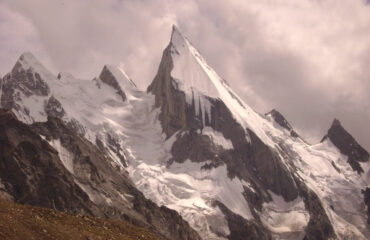 laila peak expedition
laila peak expedition
laila peak expedition
laila peak expedition
-
 laila peak expedition
laila peak expedition
laila peak expedition
laila peak expedition
-
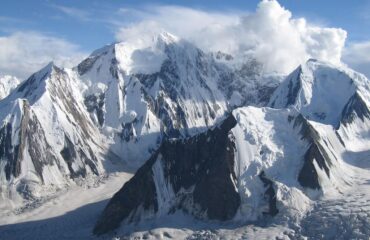 laila peak expedition
laila peak expedition
laila peak expedition
laila peak expedition
-
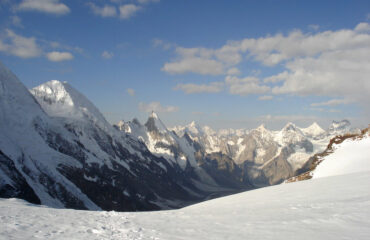 laila peak expedition
laila peak expedition
laila peak expedition
laila peak expedition
-
 laila peak expedition
laila peak expedition
laila peak expedition
laila peak expedition
-
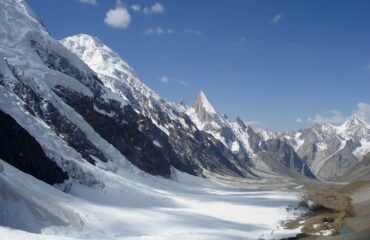 laila peak expedition
laila peak expedition
laila peak expedition
laila peak expedition
-
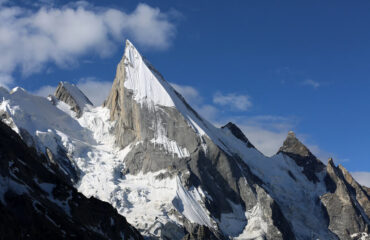 laila peak expedition
laila peak expedition
laila peak expedition
laila peak expedition
-
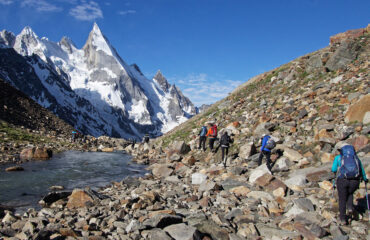 laila peak expedition
laila peak expedition
laila peak expedition
laila peak expedition
-
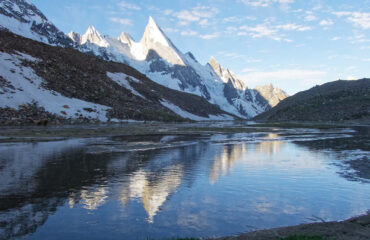 laila peak expedition
laila peak expedition
laila peak expedition
laila peak expedition
-
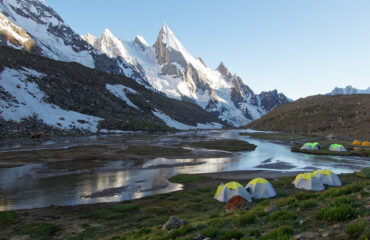 laila peak expedition
laila peak expedition
laila peak expedition
laila peak expedition
-
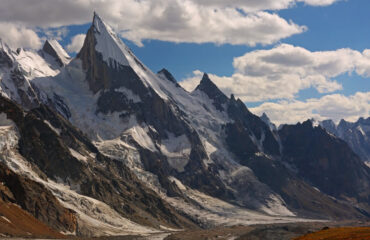 laila peak expedition
laila peak expedition
laila peak expedition
laila peak expedition
-
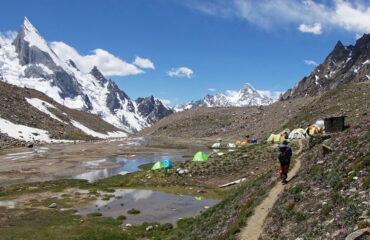 laila peak expedition
laila peak expedition
laila peak expedition
laila peak expedition
| Package Confirmed Dates | Trip Status Trip Status | Price (PP) Excluding Flights | Price (PP) Including Flights | |
|---|---|---|---|---|
|
June 20, 2025 - July 12, 2025
|
Guaranteed
|
$5,600
|
N/A
|


